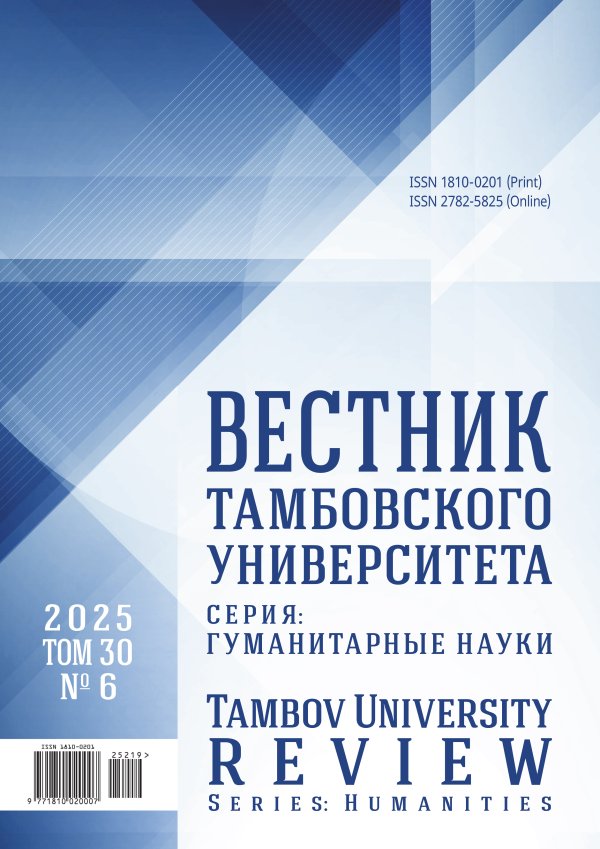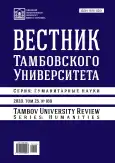Применение технологии социального консультирования малообеспеченных семей в рамках социального проекта
- Авторы: Болдина М.А.1, Грушина Д.В.2, Деева Е.В.1
-
Учреждения:
- ФГБОУ ВО «Тамбовский государственный университет им. Г.Р. Державина»
- ТОГБ Учреждение социального обслуживания населения «Забота»
- Выпуск: Том 25, № 189 (2020)
- Страницы: 107-114
- Раздел: ВОПРОСЫ СОЦИАЛЬНОЙ ПЕДАГОГИКИ И СОЦИАЛЬНОЙ РАБОТЫ
- URL: https://journal-vniispk.ru/1810-0201/article/view/298843
- DOI: https://doi.org/10.20310/1810-0201-2020-25-189-107-114
- ID: 298843
Цитировать
Полный текст
Аннотация
Представлены статистические данные о численности малообеспеченного населения и малообеспеченных семей в Российской Федерации. Охарактеризованы понятия «малообеспеченность», «малообеспеченная семья», «прожиточный минимум». Изучено проблемное поле малообеспеченных семей. Выявлены основные причины увеличения количества малообеспеченных семей в Российской Федерации. Обоснована актуальность темы исследования. Перечислены меры по улучшению качества жизни малообеспеченных семей в рамках государственной социальной политики. Изучена нормативно-правовая база социальной работы с малообеспеченными семьями. Рассмотрена сущность, этапы и принципы технологии социального консультирования. Перечислены основные качества личности, которыми должен обладать специалист по социальной работе. Выявлена и обоснована необходимость применения социальными учреждениями технологии социального консультирования при работе с малообеспеченными семьями. Представлен разработанный и реализованный социальный проект по информированию малообеспеченных семей с использованием технологии социального консультирования. Обоснована актуальность и доказана эффективность реализации данного социального проекта. Выявлена новизна и практическая значимость проекта, заключающаяся в возможности повышения уровня информированности малообеспеченных семей по социально-правовым вопросам, в кооперации усилий различных социальных учреждений в решении проблем малообеспеченных семей, привлечении и обучении волонтеров для приобретения необходимых знаний по социально-правовым вопросам.
Об авторах
М. А. Болдина
ФГБОУ ВО «Тамбовский государственный университет им. Г.Р. Державина»
Email: marina_boldina@mail.ru
ORCID iD: 0000-0003-4135-8386
кандидат педагогических наук, доцент, доцент кафедры социальной работы
Россия, 392000, Российская Федерация, г. Тамбов, ул. Интернациональная, 33Д. В. Грушина
ТОГБ Учреждение социального обслуживания населения «Забота»
Email: grushina1998@list.ru
ORCID iD: 0000-0001-9968-1341
специалист отдела по работе с населением
Россия, 392000, Российская Федерация, г. Тамбов, ул. Интернациональная, 33Е. В. Деева
ФГБОУ ВО «Тамбовский государственный университет им. Г.Р. Державина»
Автор, ответственный за переписку.
Email: deeva1707@rambler.ru
кандидат педагогических наук, доцент, доцент кафедры социальной работы
Россия, 392008, Российская Федерация, г. Тамбов, ул. Рабочая, 4аСписок литературы
- Щека Н.Ю., Микушева И.С. Факторы, приводящие к малообеспеченности семей // Азимут научных ис-следований: педагогика и психология. 2017. Т. 6. № 4 (21). С. 406-408.
- Фирсов М.В., Студенова Е.Г. Технология социальной работы. М., 2016.
- Зайнышев И.Г. Технология социальной работы. М., 2012.
- Болдина М.А., Грушина Д.В. Социальное консультирование малообеспеченных семей как технология социальной работы // Актуальные проблемы социальной истории и социальной работы: сб. науч. ст. Новочеркасск, 2018. Вып. 2. С. 176-179.
- Теория социальной работы / под общ. ред. Е.И. Холостовой, Е.Г. Студеновой. М., 2018.
Дополнительные файлы









